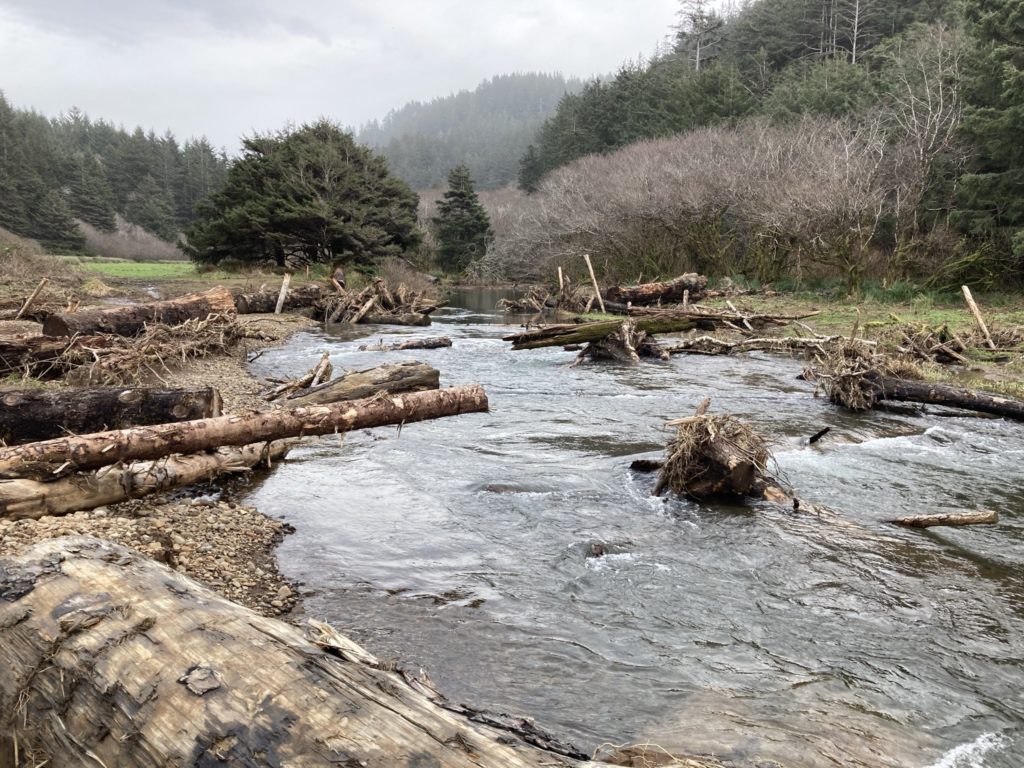
By DANA TIMS/YachatsNews.com
The wildfires that tore through the north Lincoln County community of Otis last September forced thousands to flee for their lives and left behind the smoldering ruins of hundreds of structures.
Finding a silver lining in that blackened wreckage might seem impossible.
But an environmental-restoration effort now underway to identify and salvage scores of partly burned trees otherwise headed for the chipper may represent some badly needed good news.
Trees deemed usable are being moved to storage areas, where they’ll be drawn from this summer for placement in coastal streams and marshes.
The logs are beneficial because they provide cover for juvenile fish, slow down water to form spawning grounds, and help develop deeper pools that provide refuge for both juvenile and adult fish.
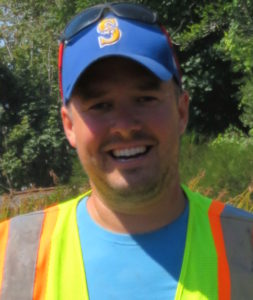
“Putting wood into streams is a short-term fix, but a badly needed one,” said Evan Hayduk, coordinator of the Newport-based Midcoast Watersheds Council, which is helping spearhead the salvage and restoration effort. “The ideal scenario would be for them to grow naturally for 200 years and let them fall into a stream. In the meantime, we’re doing this work to fill that gap.”
One of Hayduk’s immediate goals is to alert private landowners who have burned trees on their property that a tax credit and hauling costs can be at least partially covered by available grant money.
His group’s efforts are also part of a larger log-salvaging operation now underway in other areas around the state that suffered through September’s wildfires.
Eugene-based McKenzie River Trust, in particular, is leading an effort to identify logs in areas devastated by the Holiday Farm Fire near the McKenzie River town of Blue River. The logs will be implanted both in hillsides to reduce erosion and in streams to improve fish habitat.
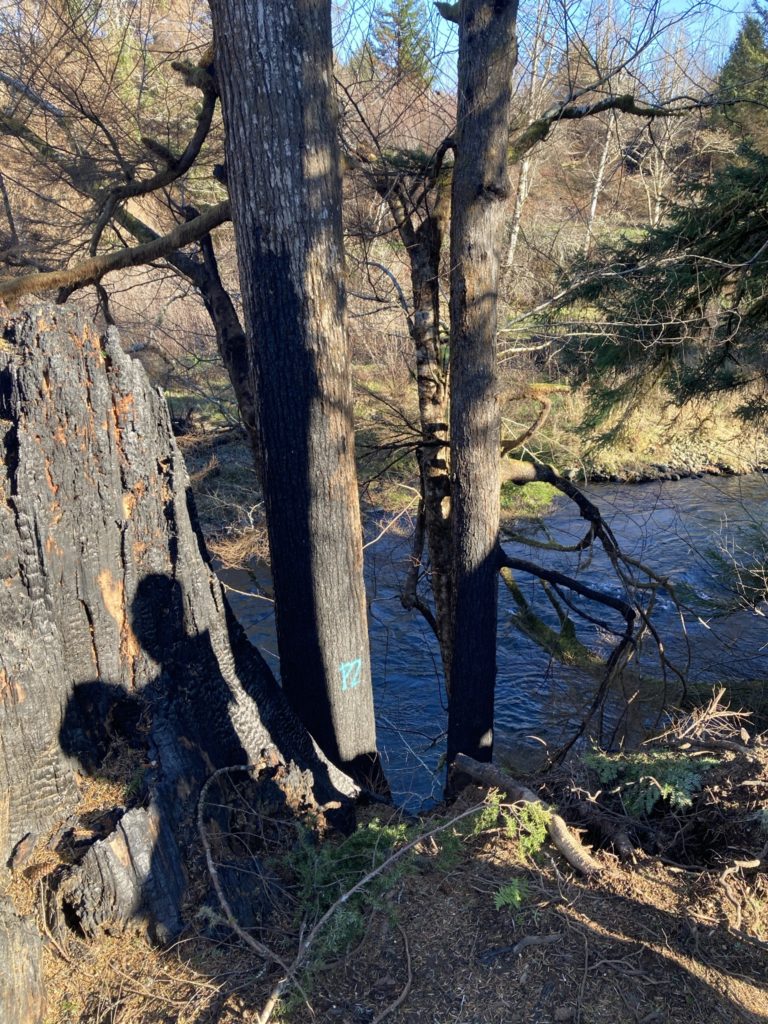
4,000 trees from around Otis
Part of Hayduk’s work involves identifying trees located as close to needed streams as possible. The cost of hauling such heavy material makes proximity a priority, he said.
Much of the actual cutting is being done by work crews contracted by PacificCorp. Of the approximately 4,000 trees marked for removal, Hayduk said, as many as 1,500 are likely to be relocated to secure storage areas around the central Oregon coast.
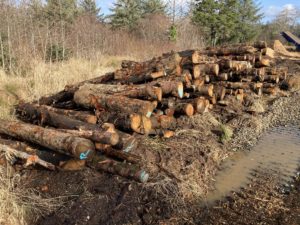
Those holding areas are necessary because of environmental regulations limiting “in-water” work to summer months.
Desired species include fir, spruce or cedar, Hayduk said. Those take longer to degrade than, say, hemlocks or hardwoods. Ideal logs for transport will also have their roots still attached to ensure stability once they’re put in a stream.
Logs without root wads must meet the Oregon Department of Fish and Wildlife’s standard for habitat restoration logs, which require that the trees be at least twice the width of the stream as measured from bank to bank, he said.
That means a tree being placed in a stream that is 25 feet across must be at least 50 feet in length.
“Getting the word out early is important because private landowners, often, have already cut a big tree into shorter lengths,” Hayduk said. “Unfortunately, that means we just can’t use them.”
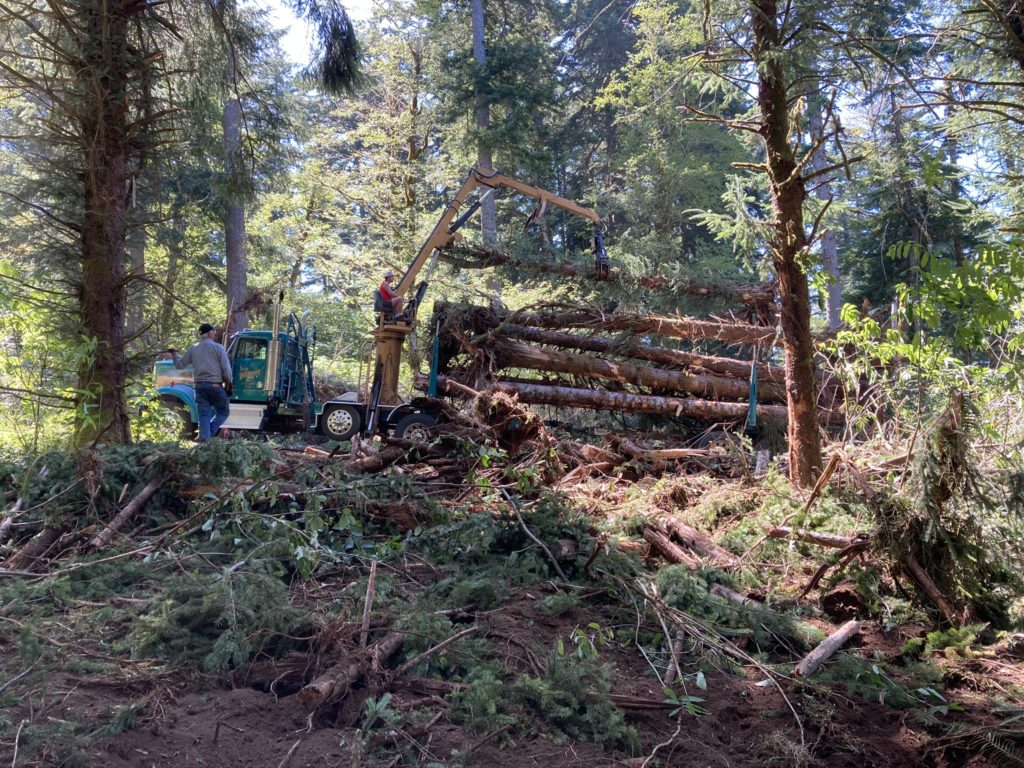
Tribes, ODFW also seek trees
Also involved are biologists from the Salmon Drift Creek Watersheds Council and the Confederated Tribes of the Siletz Indians.
The Siletz Tribe, for instance, has set aside three areas on land it owns for log storage, said Stan van de Wetering, the tribe’s biologist.
“The coordination of this effort is going very well and we are enthusiastic about the opportunity,” he said. “The logs aren’t moving yet, but we are hopeful they will be soon.”
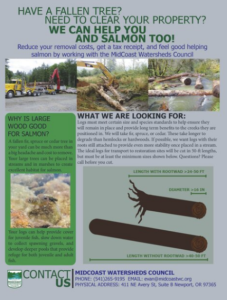
The areas van de Wetering prefers to focus on are in the lower portions of rivers and streams, where enough water is flowing that is may need to be slowed by placement of large logs. Often, however, there aren’t many big logs available in lower elevations; instead, ideal logs may be situated much higher up in a watershed, where a timber-cutting operation may be underway. Access to those logs can be costly and logistically challenging.
The Otis fires changed that calculus completely.
“It doesn’t even need to be said that no one wanted to see this happen,” van de Wetering said. “For me, at this point, the best way to look at it is that at least we’re not losing all the trees to chipping or putting them in a landfill. If our priority is to improve fish and wildlife habitat, we’re now managing to recycle some of that habitat.”
Derek Wilson, an Oregon Department of Fish and Wildlife biologist, agrees.
“Despite the horrific loss to so many people,” he said, “we are using materials after the fact that will help estuaries, streams, wetlands and tidal swamp restoration.”
Hayduk and others involved in the effort are reluctant to reveal exactly where logs are being stored prior to stream placement. That’s because what he calls “wood jackals” invariably sniff out unsecured areas before taking chainsaws to the logs for use as firewood.
“We had one area south of Yachats before all this that had about 1,000 pieces of usable wood,” he said. “It had both a chain and several large boulders to protect it. And yet someone still managed to use a pickup to move the boulders, yank the chain out of the ground and make off with an awful lot of sawed-up wood.”
Nature, it turns out, isn’t alone in sometimes wrecking havoc with trees of the Oregon coast.
- Dana Tims is an Oregon freelance writer who contributes regularly to YachatsNews.com. He can be reached at DanaTims24@gmail.com




















